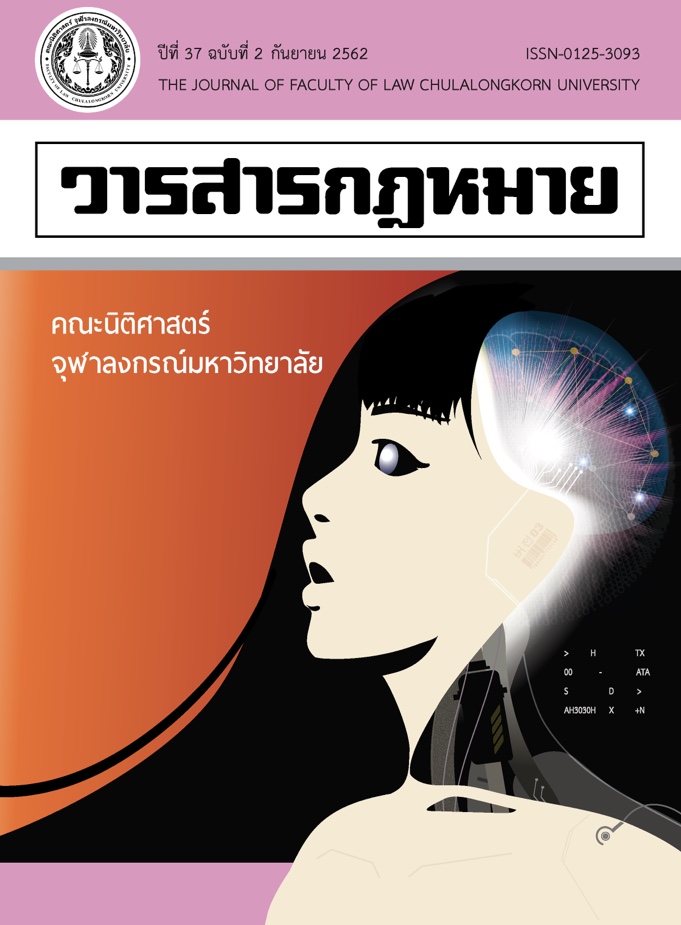การเพิกถอนนิติกรรม “ฉ้อฉล” และการปกป้องเจ้าหนี้ของบริษัทในประเทศไทย: เปรียบเทียบกับกฎหมายอังกฤษและเยอรมัน
Main Article Content
บทคัดย่อ
หลักการกำกับดูแลกิจการที่ดีในประเทศไทยฉบับล่าสุด ยอมรับความจำเป็นที่จะต้องพิจารณาผลประโยชน์ของบุคคลหลายกลุ่มในการตัดสินใจของกิจการ รวมทั้งผลประโยชน์ของเจ้าหนี้ของบริษัท อย่างไรก็ดี เมื่อสภาพแวดล้อมทางกฎหมายไม่เป็นไปในทางเดียวกับคุณค่าที่แสดงไว้ในหลักการดังกล่าว จึงก่อให้เกิดความเสี่ยงที่กิจการจะละเลยข้อบังคับที่ขัดกัน บทความนี้ศึกษาแง่มุมหนึ่งของการคุ้มครองเจ้าหนี้ของบริษัทโดยการใช้กฎหมายว่าด้วยบริษัทและกฎหมายล้มละลาย และสิทธิที่จะเพิกถอนนิติกรรมฉ้อฉล ซึ่งกฎหมายไทยในเรื่องนี้มีลักษณะเช่นเดียวกับกฎหมายว่าด้วยบริษัทและกฎหมายล้มละลาย คือได้รับการปลูกถ่ายจากต้นแบบกฎหมายยุโรปในช่วงคริสศตวรรษที่ 19 และคริสศตวรรษที่ 20 ตอนต้น ซึ่งกฎหมายอังกฤษและเยอรมันมีอิทธิพลเป็นอย่างมาก อย่างไรก็ดี การศึกษาเปรียบเทียบแหล่งที่มาของกฎหมายเหล่านี้ แสดงให้เห็นว่า แม้กฎหมายไทยจะมีลักษณะคล้ายกับกฎหมายเหล่านี้เมื่อพิจารณาโดยผิวเผิน แต่แท้จริงแล้วกฎหมายไทยมีพัฒนาการที่ต่างไป กล่าวคือ แม้ว่ากฎหมายอังกฤษและเยอรมันจะมีพัฒนาการเรื่องการคุ้มครองเจ้าหนี้ที่ต่างกัน แต่กฎหมายทั้งสองระบบใช้วิธีการทดสอบแบบภาววิสัยในการแก้ปัญหาเรื่องการเจือจางสินทรัพย์ในบริบทบางประการ ซึ่งต่างจากกฎหมายไทยที่มีข้อบังคับเกี่ยวกับการกระทำอันขาดจริยธรรมโดยบุคคลภายในบริษัทเพื่อให้เจ้าหนี้สามารถได้รับการเยียวยาได้ แนวคิดของกฎหมายไทยดังนี้จึงต่างอย่างชัดเจนกับกฎหมายในประเทศที่นำมาเปรียบเทียบ ในที่สุดแล้ว กฎหมายไทยสนับสนุนให้มีความยืดหยุ่นในการที่บุคคลภายในบริษัทจะสามารถบริหารทรัพย์สินของบริษัท แม้ว่าจะก่อให้เกิดผลร้ายต่อเจ้าหนี้ หากว่าการกระทำถือเป็นการกระทำที่มีจริยธรรม ข้อสรุปเหล่านี้จึงค้านกับข้อสันนิษฐานโดยนัยในการนำหลักการกำกับดูแลกิจการที่ดีมาใช้ รวมทั้งค้านกับการนำหลักการนี้ไปใช้ในสภาพแวดล้อมทางกฎหมายของประเทศไทย
Article Details
ลิขสิทธิ์และเนื้อหาในเว็บไซต์ของวารสารกฎหมาย (รวมถึง โดยไม่จำกัดเฉพาะ เนื้อหา รหัสคอมพิวเตอร์ งานศิลป์ ภาพถ่าย รูปภาพ ดนตรีกรรม โสตทัศนวัสดุ) เป็นกรรมสิทธิ์ของวารสารกฎหมาย และผู้ได้รับการโอนสิทธิทุกราย
1. วารสารกฎหมาย ให้อนุญาตให้คุณใช้สิทธิอันไม่เฉพาะเจาะจงที่สามารถถูกถอนเมื่อใดก็ได้ โดยไม่มีค่าใช้จ่าย ในการ
- เยี่ยมชมเว็บไซต์และเอกสารในเว็บไซต์นี้ จากคอมพิวเตอร์หรือเครื่องมือสื่อสารผ่านเว็บบราวเซอร์
- คัดลอกและจัดเก็บเว็บไซต์และเอกสารในเว็บไซต์นี้บนลงคอมพิวเตอร์ของคุณผ่านระบบความจำ cache
- สั่งพิมพ์เอกสารจากเว็บไซต์นี้สำหรับการใช้ส่วนตัวของคุณ
- ผลงานที่ได้รับการตีพิมพ์โดยวารสารกฎหมาย จุฬาลงกรณ์มหาวิทยาลัย ถูกคุ้มครองภายใต้ Creative Commons Attribution 4.0 International License ซึ่งอนุญาตให้ทุกคนสามารถคัดลอก แจกจ่าย ดัดแปลง ส่งต่อ ผลงานได้ ก็ต่อเมื่อผลงานและแหล่งข้อมูลได้รับการอ้างอิงอย่างเหมาะสม
2. วารสารกฎหมาย จุฬาลงกรณ์มหาวิทยาลัย สงวนสิทธิ์ไม่อนุญาตให้คุณใช้สิทธิอื่นใดที่เกี่ยวข้องกับเว็บไซต์และเอกสารบนเว็บไซต์นี้ เช่น การคัดลอก ดัดแปลง เปลี่ยนแปลง ส่งต่อ ตีพิมพ์ แจกจ่าย เผยแพร่ จัดแสดงในที่สาธารณะ ไม่ว่าจะในรูปแบบใดก็ตาม ซึ่งเว็บไซต์หรือเอกสารบนเว็บไซต์ โดยไม่อ้างอิงถึงแหล่งข้อมูลหรือโดยไม่ได้รับอนุญาตเป็นลายลักษณ์อักษรจากวารสารกฎหมาย จุฬาลงกรณ์มหาวิทยาลัย
3. คุณอาจขออนุญาตที่จะใช้เอกสารอันมีลิขสิทธิ์บนเว็บไซต์นี้โดยการเขียนอีเมลล์มายัง journal@law.chula.ac.th
4. วารสารกฎหมาย จุฬาลงกรณ์มหาวิทยาลัย เข้มงวดกับการคุ้มครองลิขสิทธิ์อย่างมาก หากวารสารกฎหมาย จุฬาลงกรณ์มหาวิทยาลัยพบว่าคุณได้ใช้เอกสารอันมีลิขสิทธิ์บนเว็บไซต์นี้โดยไม่ถูกต้องตามการอนุญาตให้ใช้สิทธิ ดังที่กล่าวไปข้างต้น วารสารกฎหมาย จุฬาลงกรณ์มหาวิทยาลัยอาจดำเนินคดีตามกฎหมายต่อคุณได้ เพื่อเรียกร้องค่าเสียหายที่เป็นตัวเงินและคำขอชั่วคราวให้คุณหยุดการใช้เอกสารดังกล่าว ทั้งนี้ คุณอาจถูกสั่งให้ชดใช้ค่าใช้จ่ายใดๆ ที่เกี่ยวข้องกับการดำเนินการตามกฎหมายนี้
หากคุณพบเห็นการใช้เอกสารอันมีลิขสิทธิ์ของวารสารกฎหมาย จุฬาลงกรณ์มหาวิทยาลัย ที่ขัดหรืออาจขัดต่อการอนุญาตให้ใช้สิทธิดังที่ได้กล่าวไปข้างต้น โดยเชื่อว่าได้ละเมิดลิขสิทธิ์ของคุณหรือของผู้อื่น สามารถร้องเรียนมาได้ที่ journal@law.chula.ac.th


